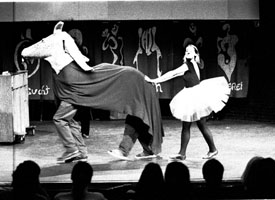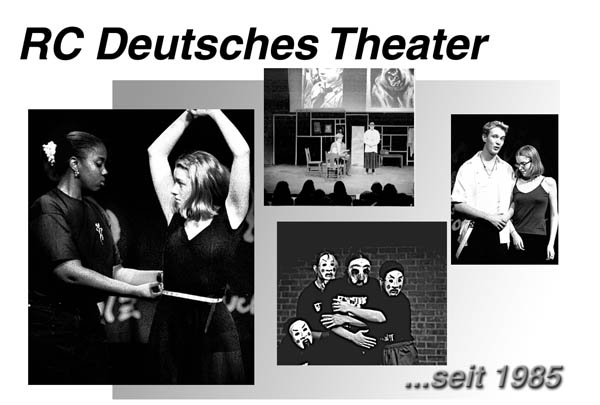by J.H.Shier
RC Deutsches Theater celebrates its 15th anniversary, Winter 2000
(Originally written for the U-M Residential College Summer 2000 Newsletter)
RC German students may not like the smell of the greasepaint, but they have come to love the roar of the crowd. Fifteen years of using theater as a tool to enhance the learning experience have gradually changed the profile of an already successful proficiency-based program and made it a model for interdisciplinary education. The RC Deutsches Theater (DT), a classroom- and student-based theater company, has staged over twenty German-language plays since 1985.
 The
company grew out of a long-standing tradition for
second-year German students to stage a cabaret just before
the proficiency exam. (The goal behind this tradition was to
help students put their language learning in perspective,
i.e., to get students to focus on what they "could" do and
not get overly anxious about the upcoming exam.) The first
play production project was so popular among students that
there was never any question about continuing with
"Deutsches Theater". Productions since have ranged from
original student-written works to full-length multimedia
productions of plays by twentieth-Century German, Swiss, and
Austrian playwrights.
The
company grew out of a long-standing tradition for
second-year German students to stage a cabaret just before
the proficiency exam. (The goal behind this tradition was to
help students put their language learning in perspective,
i.e., to get students to focus on what they "could" do and
not get overly anxious about the upcoming exam.) The first
play production project was so popular among students that
there was never any question about continuing with
"Deutsches Theater". Productions since have ranged from
original student-written works to full-length multimedia
productions of plays by twentieth-Century German, Swiss, and
Austrian playwrights.
The primary goals of
DT are to improve the German of the participants, enhance
their awareness of German-speaking cultures and literatures,
and to provide an opportunity for others to witness German
in action. In all of these areas the ongoing project has
been successful. Through interpretation and performance of
roles, students improve in areas of language mastery, which
are not easily addressed in foreign language instruction. These include:
accent, intonation, expression of emotion, gesture, language
rhythm and speech tempo. Beyond language mastery, intimacy
with a text enables students to gain an understanding of
aspects of the target culture communication, which is
reinforced through the overall interpretation, and success
of the production. The production itself accomplishes the
third objective. We have been fortunate in receiving support
not only from the university community from, but from the
community at large, with all projects since 1989 being
funded by the Goethe Institut. DT consistently draws good
crowds at the RC and other venues we have used (such as
Pioneer High's Little Theater) and despite the fact that we
don't charge admission, there have been rumors of ticket
scalping to the poor souls who show up every year who don't
speak a word of German.
addressed in foreign language instruction. These include:
accent, intonation, expression of emotion, gesture, language
rhythm and speech tempo. Beyond language mastery, intimacy
with a text enables students to gain an understanding of
aspects of the target culture communication, which is
reinforced through the overall interpretation, and success
of the production. The production itself accomplishes the
third objective. We have been fortunate in receiving support
not only from the university community from, but from the
community at large, with all projects since 1989 being
funded by the Goethe Institut. DT consistently draws good
crowds at the RC and other venues we have used (such as
Pioneer High's Little Theater) and despite the fact that we
don't charge admission, there have been rumors of ticket
scalping to the poor souls who show up every year who don't
speak a word of German.
 RC
Deutsches Theater endeavors to demonstrate ideas on stage to
spurn audience members to question the consequences of their
own behavior. In our April 2000 benefit production, for
example, costuming, projected slides, percussive music, and
movement were used as aesthetic means to promote greater
awareness of social injustices and the uneven distribution
of wealth, two major themes of the play, der
Rattenfänger, by Michael Ende. This modern
interpretation of the Pied Piper refers to unnecessary
destruction of the environment, and humans' false sense of
superiority over other species, so monetary proceeds from
this play went directly to a fund to help stop the
endangerment of Eastern Congo Plains Gorillas. Throughout
the years, DT projects have raised thousands of dollars for
local and international causes and collected food for local
shelters.
RC
Deutsches Theater endeavors to demonstrate ideas on stage to
spurn audience members to question the consequences of their
own behavior. In our April 2000 benefit production, for
example, costuming, projected slides, percussive music, and
movement were used as aesthetic means to promote greater
awareness of social injustices and the uneven distribution
of wealth, two major themes of the play, der
Rattenfänger, by Michael Ende. This modern
interpretation of the Pied Piper refers to unnecessary
destruction of the environment, and humans' false sense of
superiority over other species, so monetary proceeds from
this play went directly to a fund to help stop the
endangerment of Eastern Congo Plains Gorillas. Throughout
the years, DT projects have raised thousands of dollars for
local and international causes and collected food for local
shelters.
In the final
analysis, this is a classroom activity, and perhaps one of
the most important and rewarding aspects of the projects of
DT has been the cooperation among students working on each
project. It is not uncommon for students from different
levels and with different abilities to work side by side.
Students involved in DT work together as an ensemble and
learn from each other as well as from the project itself. In
addition to performing in the play, they work on all facets
of the production, including sets, properties, lighting,
sound, orchestra, advertising, program notes, costumes,
make-up, T-shirt design and slide preparation. Most often,
the cast is made up of approximately half veterans and half-new ensemble
members. Often, a cast includes students whose experiences
with the company were in four or five separate productions.
This has made DT a learning forum for students, which has
extended beyond the project at hand and well beyond
conventional classroom learning. For several projects, we
have brought in experts to provide training in movement,
mask making, and speech performance. In many years, DT has
held retreats and given workshops off campus and we have
taken several performances on the road.
of approximately half veterans and half-new ensemble
members. Often, a cast includes students whose experiences
with the company were in four or five separate productions.
This has made DT a learning forum for students, which has
extended beyond the project at hand and well beyond
conventional classroom learning. For several projects, we
have brought in experts to provide training in movement,
mask making, and speech performance. In many years, DT has
held retreats and given workshops off campus and we have
taken several performances on the road.
My first years
directing, I was fortunate to have some good mentors in
Martin Walsh, Peter Ferran, and Bob Brown. Martin Walsh has
even appeared in several DT productions, including our most
recent, in which he played the role of the Rat King. In
recent years, I've benefited from support from Kate
Mendeloff, with whom I have also had the opportunity to
team-teach. Brecht penned most of the plays DT has
performed, and because Brecht dealt not only with theme, but
also with mode of presentation, there has been a strong
Brechtian influence in our performance style. This impact
spans from the GRIPS play we performed (political children's theater)
to plays by Weiss and Bauer to Jelinek. Brecht is also
(still) a perfect fit in the RC, which has long prided
itself on being activist.
the GRIPS play we performed (political children's theater)
to plays by Weiss and Bauer to Jelinek. Brecht is also
(still) a perfect fit in the RC, which has long prided
itself on being activist.
In recent years, DT participants have been exposed to a broader range of theater (image theater, improvisation, and Boal's theater exercises) to take students beyond Brecht. This year, for the first time, students in the project read plays by up-and-coming contemporary playwrights. A course web site provided links to web pages of major theaters in Germany, Switzerland, and Austria, to web pages by and about the playwrights we read, and about the annual Berliner Theater Treffen, a theater festival to which the top German-language productions are invited each year. My own attendance at this festival for the past few years has made
it clear to me that taking DT participants (perhaps even
alumni?) to study German-language theater at the "Theater
Treffen" is the next logical enhancement to the project.
attendance at this festival for the past few years has made
it clear to me that taking DT participants (perhaps even
alumni?) to study German-language theater at the "Theater
Treffen" is the next logical enhancement to the project.
Deutsches Theater veterans go on to live normal and productive lives and they've done so in virtually every field. One of the gratifying things that happens, working with undergraduates on theater projects is that I get to know them better than in the regular classroom context and they often keep in touch with me long after they have left Ann Arbor. I enjoy knowing about students' career paths. Some of our set builders have gone on into architecture; there are several lawyers from our group, many educators (some of whom have incorporated theater into their teaching) and several practicing artists (in theater, fine arts, music and dance). One DT alum, Gerami Seitzman (DT 1991, 1992, 1993) was asked to explain Brecht's "Verfremdungseffekt" (alienation effect) at a medical school interview at a prestigious Ivy League School. She was also asked if she would perform part of the scene "The Jewish Wife". (It is true that I always tell students that they never know how their DT experience might pay off!). She was accepted for admission, but fortunately for us, she chose to go to U-M and I was lucky enough to direct her in '98 and '99 during her third and fourth year of medical school. I wasn't surprised that she was chosen by her classmates to give the medical school graduation address. A recent graduate auditioned against 200-some others and was selected to be a character at Disney World -- not as easy a job to land as one might expect! Our singer, Andrea Trebnik, who sang songs I composed for the 1993 DT production of Brecht's Fear and Misery of the Third Reich, took first place for Mezzo Soprano in the Metropolitan Opera's Young Performers Competition (not singing my music, of course!) in 1998. It helps to have consultants out there from amongst my former students who can answer my questions! I hear quite regularly from former actors when their job sends them to Germany and they are surprised by how much German they remember. That never surprises me! Students in DT can usually recite all parts from start to finish by the time the play opens.
Foreign language theater, with its built-in commitment to both process and product, provides an arena and model for learning that increases students' confidence to reach beyond individual limitations and promotes their responsibility and desire to be actively engaged in their own learning process. At the same time that students experiment with and manipulate a text to provide different interpretations, they must bring something of themselves to the performance. This puts the RC Deutsches Theater experience in keeping with the overall RC mission and goals and provides students with fond memories of their undergraduate years long after graduation. For my part as a teacher, these students have provided some of my most rewarding challenges and some of my fondest memories.

